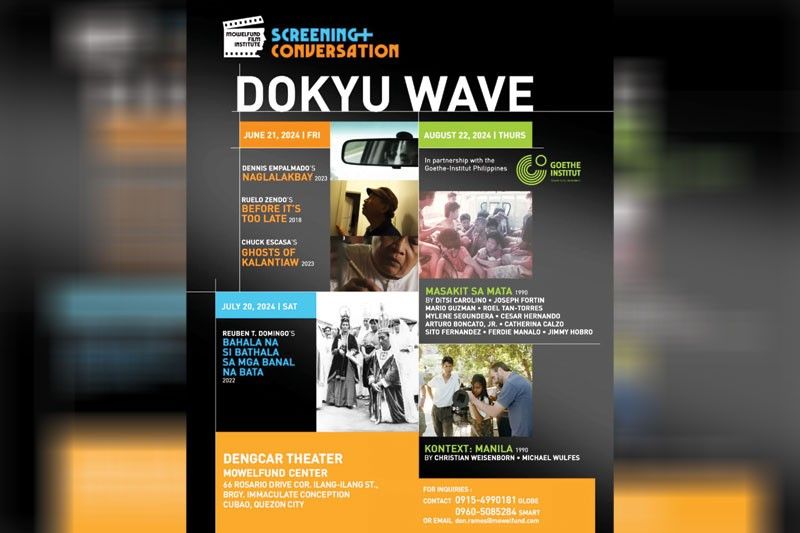Last exit from Lantana


On the third Friday of June just days before the Feast of San Juan, Mowelfund held its first screening of the “Dokyu Wave” series at the Conrado “Dengcar” Baltazar Theater in its office off Rosario Drive (now Betty Go Belmonte St.) cor. Ilang-ilang. The documentaries were Dennis Empalmado’s “Naglalakbay” (“Travelers”), Ruelo Zendo’s “Before It’s Too Late,” and Chuck Escasa’s “Ghosts of Kalantiaw.”
Documentaries as a genre are often underappreciated if not underrated, but in the hands of a creative and deliberate director who knows how to push the boundaries of the form, they can become powerful narratives that can incite discourse and maybe question the status quo. It was evident in the films shown that afternoon into evening, on the sixth floor of a building in New Manila as another thunderstorm threatened the metropolis.
Empalmado’s “Naglalakbay” chose to deal with the Filipino diaspora, and the constant search for a better life abroad, mostly in the United States, still seen as the land of milk and honey after all these years. Through disparate narratives — a San Pablo boy signing up for the US Navy in Subic, a PhD candidate in Los Angeles, a skateboarding Laguna native who seeks to see the world by employment on a ship, an illegal alien in the US (“tago ng tago” or TNT) who continuously goes through his shadow existence, a restaurant owner no longer fooled by the American dream — the overseas Filipino is seen through a kaleidoscopic-like lens, the better to piece together the fractured aspirations of a people who only want to strive for upliftment, if not for themselves then surely for their kids or the next generation of possible immigrants or resettlers.
Always lurking in the background, however, despite their forays in a foreign land, is their memory of the motherland, all what ifs or what could have been, shedding new light on the phrase you can’t go home again. What makes the hour-long documentary impressive is that it was 16 years in the making, with near zero hopes for a sequel or prequel, the filmmaker Empalmado said in the open forum after screening, that’s it, yun na yun.
No need to beat a dead horse, because Filipinos will always seek the proverbial greener pastures as long as things in the homeland are less than ideal, topsy turvy being the natural disorder despite the government press releases and damage control.
Yes, they may be considered heroes, but how many of us have bothered to stop and think about the tribulations our OFWs (Overseas Filipino Workers) have gone through and consistently endure? They may have found a better life, but at what price? This “Naglalakbay” tries to answer, in the process leaving the viewer with more questions to ponder.
In Zendo’s “Before it’s Too Late,” the 12-minute short documentary zeroes in on one of the characters in the first film, restaurant owner Josh of the Tribal Café in Los Angeles, who happens to have stashed on the upper section of a cabinet spools of film of the original “Genghis Khan” by Manuel Conde, in the original language yet and of which he has a copy in VHS format.
Zendo interviews Josh about the process of saving the prints contained in a few metal containers, whether archivists or representatives of the government back home made any effort to recover the precious find for proper storage if not restoration.
He says no, there wasn’t any move, talks fell through, with one Mowelfund director offering a backstory that there were reports that the resto owner was asking too much for it, and anyway there was another restored copy of “Genghis Khan” done by ABS-CBN, though not in the dubbed original.
The young documentarist remarks towards the end that the spools of film are beginning to smell faintly of vinegar, which archivists the world over consider a sign of the onset of decay, the vinegarization of “Genghis Khan,” and will someone step up and save the treasure trove before it’s too late?
Last on the playbill, after a merienda of sandwiches and coffee that offered brief respite from the arctic temperatures of Dengcar theater, was Escasa’s “Ghosts of Kalantiaw,” a worthy chronicle of the clash between history, myth and disinformation.
In the town of Batan in Aklan, residents are up in arms with the debunking of the Kalantiaw code as well the pre-Hispanic datu behind it, as the town’s pride is the Kalantiaw Shrine since been designated as a non-shrine after extensive research and double checking by reliable historians and academicians. The Kalantiaw was said to be a hoax elaborately devised by a progenitor of modern-day fake news, one Jose Marco at the turn of the last century, which plot line in itself is already the stuff of fiction.
Escasa interviewed many of the town’s oldtimers and their devotion to myth if not cultural memory, which in the course of the film can prove to be stronger and more influential than any historical facts or innuendo even if based on science or dogged research. Also given ample screen time is the historian Ambeth Ocampo, and he points out how memory is in the long run selective, and a member in the audience in the post-screen Q&A mentions the term cognitive dissonance, and how the mind often chooses what to remember and what to consign to forgetfulness.
“Ghosts” is the stuff of wide-ranging debate, and condemning purveyors of fake news and disinformation may be the easy way out when the discourse can expand to the uses of myth amid the backdrop of material history, or is it vice versa, the uses of history amid the immateriality of myth and legend so revered by the town of Batan. Why then not live and let live, or as they say, walang basagan ng trip.
A fine portrayal of the scuttlebutt monger Jose Marco was done by Joel Saracho, whose kalantiaw code sequences are given inspiring atypically hilarious animation by the cartoonist Roxlee, himself something of a part-time myth.
Escasa before “Ghosts” was best known for another hour-long documentary, “Jingle Lang ang Pahina,” some years ago chronicling the age of Jingle magazine in a time of political repression. Hopefully, there are more codes where that came from, debunked or not, the better to find our way out of the maze of New Manila under a slight drizzle and the last exit from Lantana onto the underbelly of the MRT where streetwalkers ply their ancient wares, full of maps and legends in themselves.
- Latest
- Trending

































